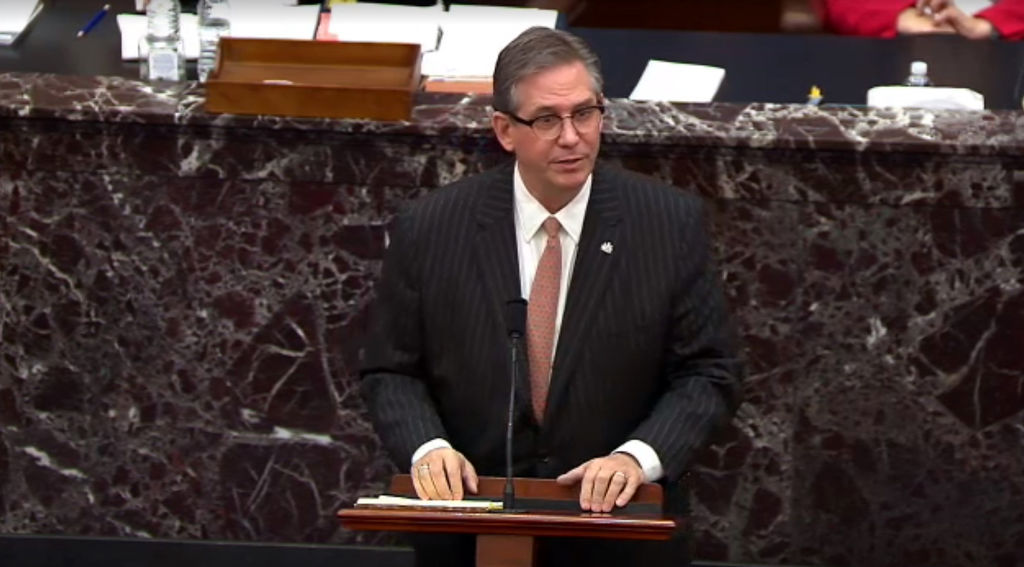Trump still hasn't conceded his election loss. But his impeachment lawyer Bruce Castor did, several times.


A free daily email with the biggest news stories of the day – and the best features from TheWeek.com
You are now subscribed
Your newsletter sign-up was successful
Former President Donald Trump was, by all accounts, furious at his impeachment trial defense team, especially lead lawyer Bruce Castor, panned across the board for his odd, rambling opening statement.
"Cocooned at his Mar-a-Lago estate, Trump watched as his defense attorneys responded to an emotional presentation by House impeachment managers with a series of dry, technical, and at times meandering arguments about due process and the constitutionality of the proceedings," Politico reports. "As they droned on, he grew increasingly frustrated with the sharp contrast between their muted response and the prosecution's opening salvo."
But Trump, watching the trial on Newsmax, wasn't just dismayed at Castor's low-energy performance and the bad reviews from allies and senator-jurors, Politico reports. Castor declined to use "graphics or a video — tools his TV-obsessed client had hoped to deploy." And the former president was upset Castor "wore an ill-fitting suit and at one point praised the case presented by the Democratic House impeachment managers," The Washington Post adds, even though Trump himself was reportedly also impressed with the impeachment managers and their video presentation.
The Week
Escape your echo chamber. Get the facts behind the news, plus analysis from multiple perspectives.

Sign up for The Week's Free Newsletters
From our morning news briefing to a weekly Good News Newsletter, get the best of The Week delivered directly to your inbox.
From our morning news briefing to a weekly Good News Newsletter, get the best of The Week delivered directly to your inbox.
And Castor notably "did what Trump himself has not: conceded Joe Biden won the presidential election," The Associated Press notes. He called Trump a "former president," said he "was removed by the voters," and argued that Americans are "smart enough to pick a new administration if they don't like the old one, and they just did."
Trump continues to insist falsely that he actually won the election, and this "big lie" — that the election was "stolen" from him — undergirds his entire impeachment trial. Castor was using Trump's status as former president to make his case, rejected by the Senate, that it's unconstitutional to try a president after he leaves office. In fact, "Trump initially pushed his impeachment lawyers to make the baseless case that the election was stolen," the Post reports, "an approach they ultimately rejected while still arguing that the First Amendment protects their client's right to share misinformation and false claims."
A free daily email with the biggest news stories of the day – and the best features from TheWeek.com
Peter has worked as a news and culture writer and editor at The Week since the site's launch in 2008. He covers politics, world affairs, religion and cultural currents. His journalism career began as a copy editor at a financial newswire and has included editorial positions at The New York Times Magazine, Facts on File, and Oregon State University.
-
 Magazine printables - February 27, 2026
Magazine printables - February 27, 2026Puzzle and Quizzes Magazine printables - February 27, 2026
-
 ‘The forces he united still shape the Democratic Party’
‘The forces he united still shape the Democratic Party’Instant Opinion Opinion, comment and editorials of the day
-
 The year’s ‘it’ vegetable is a versatile, economical wonder
The year’s ‘it’ vegetable is a versatile, economical wonderthe week recommends How to think about thinking about cabbage
-
 Rubio boosts Orbán ahead of Hungary election
Rubio boosts Orbán ahead of Hungary electionSpeed Read Far-right nationalist Prime Minister Viktor Orbán is facing a tough re-election fight after many years in power
-
 Key Bangladesh election returns old guard to power
Key Bangladesh election returns old guard to powerSpeed Read The Bangladesh Nationalist Party claimed a decisive victory
-
 Epstein files topple law CEO, roil UK government
Epstein files topple law CEO, roil UK governmentSpeed Read Peter Mandelson, Britain’s former ambassador to the US, is caught up in the scandal
-
 Iran and US prepare to meet after skirmishes
Iran and US prepare to meet after skirmishesSpeed Read The incident comes amid heightened tensions in the Middle East
-
 EU and India clinch trade pact amid US tariff war
EU and India clinch trade pact amid US tariff warSpeed Read The agreement will slash tariffs on most goods over the next decade
-
 Israel retrieves final hostage’s body from Gaza
Israel retrieves final hostage’s body from GazaSpeed Read The 24-year-old police officer was killed during the initial Hamas attack
-
 China’s Xi targets top general in growing purge
China’s Xi targets top general in growing purgeSpeed Read Zhang Youxia is being investigated over ‘grave violations’ of the law
-
 Panama and Canada are negotiating over a crucial copper mine
Panama and Canada are negotiating over a crucial copper mineIn the Spotlight Panama is set to make a final decision on the mine this summer
